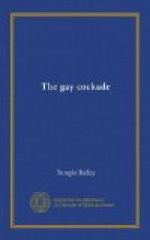In the adjoining room, volumes reached from floor to ceiling, from end to end. Petronella had a vision of this vivid young giant gloating over his two books on a rude shelf. And all her life she had had the things she wanted! Somehow the thought took the bitterness out of her attitude toward him. How strong he must be to deny himself now the one great thing that he craved when his life had held so little.
“How lovely to begin with just those two books,” she said, softly, and the radiance of her smile was dazzling.
When she showed him her presents she was still radiant. There was a queer opera-bag of Chinese needlework, with handles of jade, a Damascus bowl of pierced brass, a tea-caddy in quaint Dutch repousse; there was a silver-embroidered altar-cloth for a cushion, a bit of Copenhagen faience, all the sophisticated artistry which is sent to those who have no need for the commonplace. There were jewels, too: a bracelet of topazes surrounded by brilliants, a pair of slipper buckles of turquoises set in silver, a sapphire circlet for her little finger, a pendant of seed pearls.
As she opened the parcels and displayed her riches Justin felt bewildered. His gifts to his mother had included usually gloves and a generous check; if he had ventured to choose anything for Petronella he would not have dared go beyond a box of candy or a book; he had given his nurses pocketbooks and handkerchiefs. And the men of Petronella’s world bestowed on her brass bowls and tea-caddies!
Miss Danvers vanished up-stairs. The Admiral, having admired, slipped away to the library, encouraged by Petronella’s whispered: “Oh, uncle dear, leave us alone for just a little minute. I’ve found a way!”
Then Petronella, with that radiance still upon her, sat down on her little stool in front of the fire, and looked at Justin on the other side of the hearth.
“You haven’t given me anything,” she began, reproachfully.
“What could I give that would compare with these?” His hand swept toward the exquisite display. “What could I give—”
“There’s one thing,” softly.
“What?”
“That copy of ‘Treasure Island’ that your mother gave you long ago.”
Dead silence. Then, unsteadily: “Why should you want that?”
“Because your mother—loved you.”
Again dead silence. Hare did not look at her. His hand clenched the arm of his chair. His face was white. Then, very low, “Why do you—make it hard for me?”
“Because I want—the book”; she was smiling at him with her eyes like stars. “I want to read it with the eyes of the little boy—with the eyes of the little boy who looked into the future and saw life as a great adventure; who looked into the future—and dreamed.”
He had a vision, too, of that little boy, reading, in the old house in the Maine woods, by the light of an oil-lamp, on Christmas Eve, with the snow blowing outside as it blew to-night.




